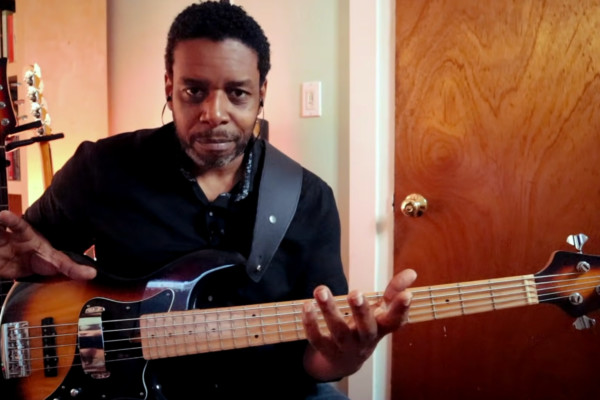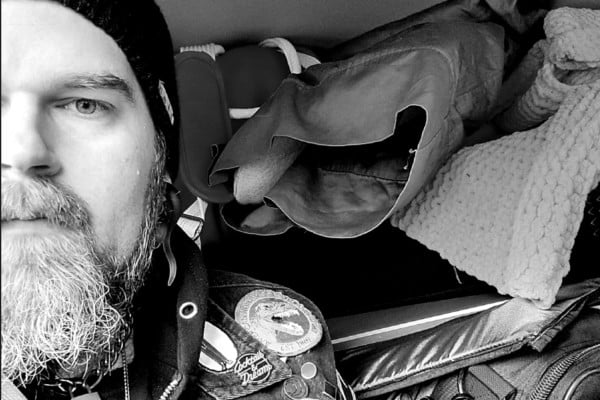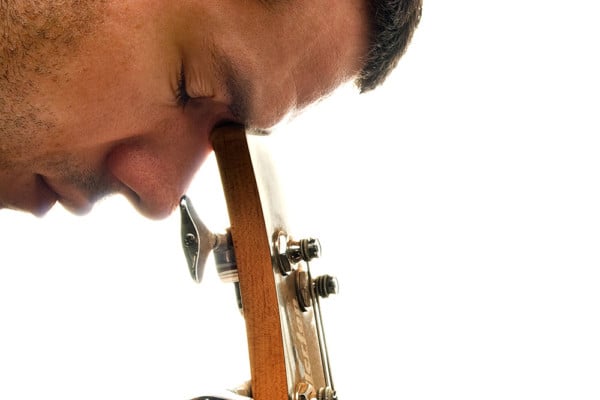I Ain’t Superstitious: Personal Quirks and Why They Work
 It’s 6pm… time to get the gear in the car, enter the club’s address into the GPS, and get on the road. It takes exactly five minutes and three trips to pack: one trip for each cabinet (the two fit side by side in the trunk), and one trip for the amp head, bag o’ stuff, and bass (all of which go in the back seat). If I’m taking anything else, such as coffee, a wardrobe change, or a mic stand, they’ll require a fourth and final trip. And away we go!
It’s 6pm… time to get the gear in the car, enter the club’s address into the GPS, and get on the road. It takes exactly five minutes and three trips to pack: one trip for each cabinet (the two fit side by side in the trunk), and one trip for the amp head, bag o’ stuff, and bass (all of which go in the back seat). If I’m taking anything else, such as coffee, a wardrobe change, or a mic stand, they’ll require a fourth and final trip. And away we go!
This process of packing the car before a gig is one of many rituals for all working musicians. Despite how obsessive compulsive it may be, this method to my madness ensures that I won’t forget anything when headed to or returning from a gig (knock on wood). Gear always goes in the same place and in the same order… cabs, amp, bags, and bass. It may not seem like a big deal to some people, but to me, and to many professional musicians, this seemingly simple process is crucial to having a successful gig experience.
Establishing a “packing plan” is one way to keep things organized and accounted for, but there are far greater reasons for having specific rituals and habits when it comes to playing bass. Whether you’re a gigging musician, a hobbyist, or something in between, I want to point out why it’s important to have specific ways of doing things. I’ll share some of my own personal quirks (or, dare I say, superstitions) and how these tendencies impact your ability to practice and perform. Hopefully, you’ll start to recognize some of your own habits, perhaps adapt some new ones, and realize why they work.
Let’s start with practice time. When it comes to wood shedding, it’s hard to shut off the world and draw your attention on one thing. Cell phones, Facebook updates, email, and millions of other things exist to distract us, so it’s important to bring yourself into a different mental space. Personally, if I’m intent on practicing, I’ll move from my desk chair to my practice stool… the stool happens to be in the same room, roughly two feet away from my desk. Although this may not seem like a major change of scenery, this action does two things: it puts my computer out of reach (which separates myself from obvious distraction), and it puts me in front of my music stand and metronome (my practice space).
In this case, the physical act of moving to a different chair has a huge effect on my frame of mind: it transfers my attention to my instrument. Since I’m out of reach of my computer, having to stand up and walk to my desk makes me less likely to compulsively check email. Case in point: it helps me get down to business. If you seem to have trouble focusing and motivating yourself to practice, try creating a simple ritual to define your time in the shed. Perhaps it’s moving to a different chair or room, starting off with a specific exercise, or clicking your heels three times and saying “there’s no place like bass, there’s no place like bass.”
On the gig, setting up gear happens to be my favorite ritual. While some consider it a hassle and long for a roadie or bass tech, I relish in the fact that everything is where I left it, all cables get correctly plugged in, and I can enjoy a few moments of “quiet time” to clear my head. Having an efficient set up process is essential… if you get stuck in traffic and have all of five minutes to load in, you don’t want to be fishing around for your gear (especially on a dark stage). If you correctly and consistently wrap your cables, you will enjoy peace of mind and may extend the lifetime of your gear. People frequently ask to help me set up or tear down, which is kind and considerate on their part, but a potential hassle and liability on mine. I usually thank them for their offer, but kindly decline their assistance.
Aside from the “practical” reasons for setting up gear, going through the motions becomes an act of meditation, resulting in a few moments of mental clarity and an opportunity to distance yourself from the rest of the world. Getting to a gig can be stressful, especially if you’re dealing with rush hour or a difficult load in. Having to complete a familiar task, such as setting up your amp, can detach you from the stressful events of the day and introduce a new frame of mind. Similar to any morning ritual (such as making coffee, reading the paper, and then leaving for work), it helps to define your attitude and welcome you to the gig.
Packing up at the end of the night is a standard ritual that can be personally or socially beneficial. Perhaps you take this time to get to know the other band members or the sound man; you may even get some input on how the gig went or a good movie to check out. Otherwise, you can keep to yourself and privately review the gig in your head. If you had an amazing playing experience and truly clicked with all of the band members, this is your time to bask in the greatness of the evening. Or, if you didn’t have an “on” night or you received bad news about your compensation (or lack thereof), then this is the time to mull it over, let off a little bit of steam, and figure out how to handle the situation. Hopefully, most gigs will end positively, but for those that don’t, you’ll have these moments (as well as the drive home), to think it over.
Now let’s talk about superstitions… this may or may not include lucky underwear, a rabbit foot keychain, or Stevie Wonder.
Superstitions are similar to habits or rituals, but they are uniquely personal and somewhat irrational. For instance, I make a point of always using my tuner and cable. This doesn’t mean that I refuse to use anything else, but for some reason, it’s important for me to use the small, silver Korg plug-in tuner and my wacky never-unwraps-correctly cable (yes, I do wrap it correctly). I also like to start the gig off with a “1-2-3-4” finger exercise, and, despite how much I may have practiced earlier in the day, I feel like I won’t play as well if I don’t start off with the exercise. I’ve tried using other finger exercises, which does loosen up my hands, but it’s just not the same. Another superstition involves listening to the same music as I drive to certain gigs. For a long time, there were a handful of clubs that I played on a regular basis, and if I had a successful night there, I attributed it to the music I listened to during the drive. Like I said before, this is fairly irrational and may have no real significant impact — you simply believe that it does.
While these personal quirks aren’t too crazy or out of the ordinary, I find it beneficial to identify what they are and what function they serve. Listening to Paul Simon on the way to a bass lesson week after week may not actually impact how the lesson goes, but it puts me in my happy place and opens my mind to learning. Try taking a few minutes to recognize some of your own habits, rituals, quirks, or superstitions, and think about why you do what you do. Whether you’ve developed a foolproof way of packing your vehicle, or an important pre-practice ritual, you’ll start to see the “greater meaning” behind these motions. The reasons may not always be obvious, but they’re certainly worth thinking about.
What are some of your routines or superstitions? I’d love to hear them. Share your story in the comments.
Photo by Beate W
Ryan Madora is a professional bass player, author, and educator living in Nashville, TN. In addition to touring and session work, she teaches private lessons and masterclasses to students of all levels. Visit her website to learn more!




There is actually a psychological reason that listening to certain music puts you in a certain state of mind. The brain latches onto things that repeat, as I’m sure everyone’s noticed. But you can train it, for example you could listen to a specific song before practicing every time, and eventually hearing that song will put you in the mood to practice.
As a musicians wife let me point out the importance of supporting these routines. Don’t take offense when your spouse says ” I’d love to have you come to the gig but you can’t ride with me”.
Let me add some alternative point of view. I’ve been playing for more than 20 years and I’ve never had a special ritual or superstition. Most of the times my ritual is to joke. Gigs are better when everybody in the band is gettin som efun.
For some reason I always put the bass I’m using on the back seat using the left side door and have my bass lying from (body-neck) left to right in the car. But then take it out of the right. I don’t know if it’s because I’m left-handed – though I play a right-handed bass, but I always do this.
I thought I was unique to a lot of that stuff but I guess we all have little rituals and idiosyncrasies. Fun (PS – I discovered long ago that listening to the wrong music can effect my playing on the gig in a bad way. Now, I always listen to music that relates to the gig I’m doing, stylistically. I usually try and pick an album that I aspire too emulate in some way.)
What I have found is that if I don’t use 20-39 minutes upfront of listening time before practice or a gig, it doesn’t go well. For example, if this is my day for working on interesting funk lines, I’ll dial in Marcus Miller and let that absorb. If I’m looking for the Jaco approach for something, I’ll first immerse myself in a few of his tunes and so on.
The “practice space” thing is not unusual – I used to do a similar thing when I worked from home (and others did, too,) just to provide that break from “I am at home and can do what I want” to “I am at work now.” I could just move, others would drive somewhere to get their ‘work coffee’ and back – something to provide that mental divider.